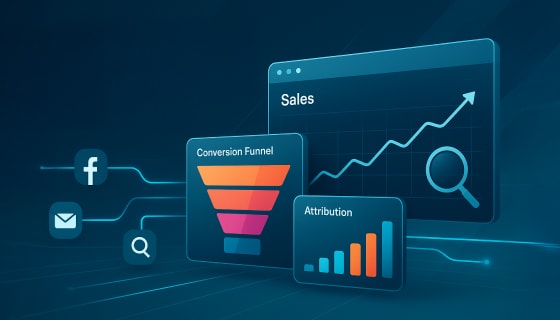If you’ve been following SEO trends, you’ve likely noticed something significant happening: search engines are moving away from just ranking links and are now focused on delivering instant answers to users. This shift is powered by AI and Generative Engine Optimization (GEO), which is fundamentally changing the way we think about content.
As a decision-maker, this presents both a huge opportunity and a significant challenge. The new game is no longer about getting clicks; it’s about having your content featured as the answer in AI-driven search results. In this guide, we’ll break down the key elements you need to know to optimize for GEO and AI, from setting up structured data to crafting content that anticipates user questions and provides direct answers.
Optimizing Your Website for GEO and AI-Driven Content
In a world where AI is pulling information directly from your website, simply having great content is no longer enough. To ensure that AI can accurately understand, interpret, and display your content as the right answer to search queries, you must optimize your website for AI-driven search engines. Let’s break down the key elements of this optimization: structured data and content clustering.
Implementing Structured Data
Structured data, also known as schema markup, is the language that helps search engines and AI algorithms understand your content more deeply. It acts as a map to search engines, showing them precisely what your content is about and how it relates to other pieces of information. By using schema markup, you can tag specific elements on your page, such as product details, reviews, or FAQs, so that AI can easily identify and categorize them. This makes it easier for search engines to serve your content as direct answers in search results, like featured snippets, knowledge panels, and other AI-driven elements.
The Power of Content Clustering
Once your content is correctly tagged with structured data, the next step is to ensure it’s organized. Content clustering involves grouping related pieces of content to form a well-organized network. By linking related articles, blog posts, or product pages, you help search engines understand the context of each page more effectively. Visitors will be able to find related information more easily, encouraging them to stay longer and engage with your content. Ultimately, organizing your content through clustering and strategic internal linking is crucial for maximizing its impact in the world of geospatial (GEO) and AI-driven content.
Address Patient Needs Directly with AI-Friendly Content
Creating content that can be easily interpreted and pulled by AI is key to getting your website featured in direct answer boxes, snippets, and other AI-driven results. But to make your content stand out in a way that AI can clearly understand and present to users, it needs to be conversational, AI-optimized content that directly addresses the needs of your audience.
One of the most effective ways to ensure your content works well with AI is by answering Frequently Asked Questions (FAQs) conversationally and directly. But there’s a twist—your answers should not only speak to the reader but also be structured in a way that AI can easily extract and feature them as direct answers in search results. AI systems, such as Google’s RankBrain, prefer explicit and concise content that answers user queries in a conversational tone, mimicking how people naturally speak.
For instance, instead of saying, “Joint replacement surgery involves the removal of damaged joints and their replacement with artificial ones,” you could rephrase it as:
“What is joint replacement surgery?
It’s a procedure where damaged joints are replaced with artificial ones to reduce pain and improve mobility.”
This type of structure, which addresses both the reader and AI, makes it easier for algorithms to recognize and select your content as the best possible answer.
To drive this point home, let’s take a look at how well-optimized FAQs can significantly impact your visibility in AI-driven search results. For example, consider a healthcare website that offers joint replacement surgery. The FAQ section could include questions like:
- What are the benefits of joint replacement surgery?
- How long does it take to recover from joint replacement surgery?
- What are the risks associated with joint replacement surgery?
Each of these questions is answered in a straightforward, concise, and easy-to-understand manner, which aligns perfectly with how AI pulls and presents data. By structuring your FAQs this way, you ensure that your content is optimized for Generative Engine Optimization (GEO) and has a higher chance of being featured as a direct answer in search results.
Measuring Your GEO Success with AI-Driven Visibility
Measuring the effectiveness of your GEO strategy requires some tools and techniques to track performance and analyze your visibility in AI-driven search results. The first step to tracking your success is understanding where and how your content is being featured.
Here are a few ways to measure whether your content is showing up in AI-driven snippets:
Use Google Search Console
Google Search Console offers a comprehensive understanding of how Google interacts with your content. In the Performance Report, you can check which queries are bringing traffic to your site and see if your content is being included in featured snippets, “People Also Ask” boxes, or knowledge panels. By analyzing the Query section and filtering for impressions, you can identify which pages are being highlighted as answers.
Search for Your Keywords
One of the simplest ways to check if your content is being featured is by searching for your target keywords on Google. If your page appears in the featured snippets, knowledge panels, or people also ask boxes, that’s a clear sign that your content is performing well with AI. Regularly checking these results can provide you with an immediate understanding of how your SEO and geo efforts are translating into visibility.
Track Click-Through Rates (CTR)
Once your content is featured in these AI-driven sections, monitor the click-through rate (CTR) of your pages to track their effectiveness. If your CTR increases significantly for those pages, it’s a strong indicator that users are engaging with the AI-driven results and finding your content helpful. Tools like Google Analytics and Google Search Console can help track how often your page is clicked when it appears as a result of a query.
Monitor Position Changes in SERPs
SEO tools like SEMrush, Ahrefs, and Moz provide detailed insights into how your content is ranking, including for featured snippets. These platforms can help you identify any shifts in your content’s positioning, showing whether your efforts in structuring content for AI are paying off in terms of higher rankings in AI-driven search engine results pages (SERPs).
Third-Party Tools for Snippet Tracking
To gain a more detailed understanding of how your content is presented in search results, consider using tools specifically designed to track featured snippets. Tools like Rank Tracker, AccuRanker, and ContentKing offer detailed tracking of snippets and AI-driven results, providing insights into how often your content is being featured.
Conclusion
SEO is evolving, and AI-driven content and Generative Engine Optimization (GEO) are leading the way. By optimizing your website with the proper techniques, such as structured data, content clustering, and directly answering key questions, you can ensure your content stands out and gets noticed by both users and AI. These strategies will help boost your visibility, drive more traffic, and make your website more search engine-friendly.
At ZealousWeb, we’re experts in helping businesses grow online. Our team is skilled in SEO and GEO, and we specialize in ensuring your website is optimized for the future of search. Book a 30-minute free consultation call with us and team up with us to take your website to the next level and get the results you deserve.














